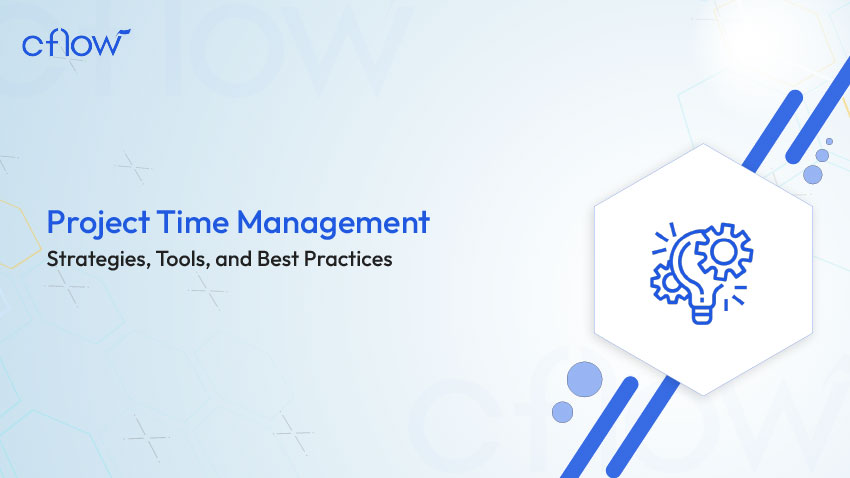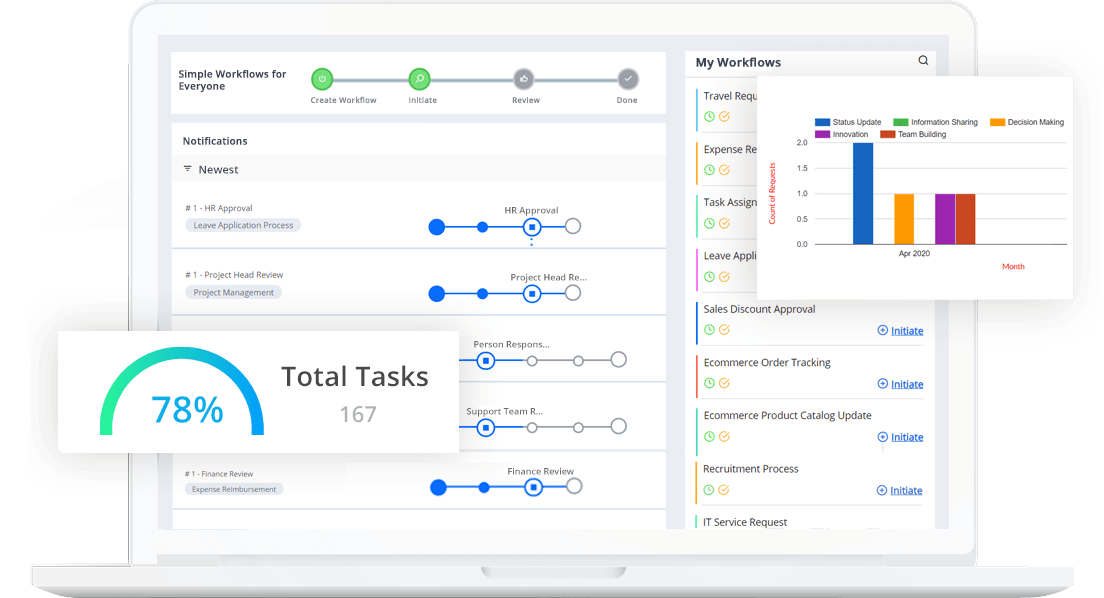Project Time Management: Strategies, Tools, and Best Practices

Key takeaways
- Effective project time management ensures timely task completion, leading to increased productivity and successful project execution.
- Planning, scheduling, and tracking time effectively reduces delays and improves overall workflow efficiency.
- Proper time management enhances decision-making, prevents over-commitment, and helps teams prioritize tasks effectively.
- Leveraging time management tools like Gantt charts, PERT charts, and project dashboards streamlines task tracking and project scheduling.
Managing time efficiently is critical to the success of any project. Project time management is the process of planning, scheduling, tracking, and controlling the time spent on various project tasks to ensure timely delivery. With businesses operating in fast-paced environments, effective time management enables teams to prioritize tasks, optimize resources, and meet deadlines efficiently.
A study in the construction industry revealed that around 31.4% of respondents believe that poor project planning and unrealistic timelines were the prime cause behind delays. By mastering time and project management techniques, businesses can reduce costs, minimize stress, and achieve better work-life balance.
This blog will explore the importance of project time management, the key processes involved, and the best time management strategies and tools to ensure successful project execution.
What is Time Management in Project Management?
Project time management refers to the structured approach of allocating time to tasks, setting priorities, and ensuring projects stay on track. It involves scheduling, tracking progress, and managing resources effectively to avoid missed deadlines.
A well-managed project timeline reduces delays, prevents last-minute rushes, and ensures efficient task execution. Companies that implement strong time management practices report higher success rates, improved employee efficiency, and optimized workflows.
The core principles of project time management include:
- Planning & Scheduling – Setting realistic deadlines and creating structured work schedules.
- Task Prioritization – Identifying high-priority tasks and allocating resources accordingly.
- Time Tracking – Monitoring the time spent on different activities to identify inefficiencies.
- Adjusting Strategies – Making necessary modifications based on real-time progress and bottlenecks.
According to a survey conducted by Capterra, 47% of business leaders reported that using time-tracking tools alongside project management systems improved their productivity markedly. By adopting a structured time management process, organizations can boost team productivity, reduce workload stress, and meet stakeholder expectations.
Table of Contents
Why is Time Management Important?
Effective project management and time management go hand in hand. Poor time management leads to missed deadlines, inefficient workflows, and increased costs. Here’s why time management is critical –
Increased Productivity
Proper time allocation allows teams to complete tasks efficiently, avoid unnecessary delays, and maintain focus on priority tasks. A structured approach helps optimize workflow, ensuring maximum output within a given timeframe.
Reduced Stress
When time is well-managed, employees experience less pressure and anxiety. A balanced workload prevents last-minute rushes and reduces burnout, leading to higher job satisfaction.
Goal Achievement
Setting clear deadlines and tracking progress ensures that milestones are met on time, contributing to the overall success of the project. Efficient scheduling keeps teams aligned with project goals.
Improved Work-Life Balance
Efficient time management enables teams to avoid excessive overtime and maintain a healthy work-life balance. Studies show that employees who work within structured schedules report better job satisfaction and productivity.
Enhanced Decision-Making
When project managers have clear visibility into time allocation and resource availability, they can make informed decisions, identify risks, and implement contingency plans.
The Seven Main Processes in Project Time Management
Effective project time management involves structured processes that guide teams from the initial planning phase to execution. These steps ensure that projects stay on track, resources are allocated efficiently, and deadlines are met. Proper time management prevents delays, minimizes risks, and ensures teams can focus on their most impactful tasks.
1. Plan Schedule Management
Planning the project schedule is the foundation of effective time management. This step defines how the schedule will be developed, monitored, and controlled throughout the project lifecycle. It involves selecting time-tracking tools, resource allocation strategies, and scheduling techniques to ensure smooth execution. A well-structured schedule management plan helps set expectations, improve accountability, and ensure alignment with project goals.
2. Define Activities
Breaking down the project into smaller, actionable tasks ensures clarity in execution. Each task should have a defined objective, estimated timeline, and assigned team member. Defining activities allows teams to prioritize work, allocate resources effectively, and track progress accurately. This step helps identify dependencies between tasks and ensures that no critical element is overlooked.
3. Sequence Activities
Once project tasks are defined, sequencing them in a logical order is critical. Using Gantt charts, dependency mapping, and timeline tracking tools, project managers can ensure that tasks are executed sequentially without conflicts or inefficiencies. Sequencing activities also help in identifying critical paths, optimizing workflows, and preventing bottlenecks that could delay project completion.
4. Estimate Resources
Estimating the necessary personnel, tools, and materials ensures that every task is completed without resource shortages. Accurate resource allocation prevents underutilization and overburdening of team members. Teams must analyze workload distribution, forecast potential constraints, and use resource management tools to balance assignments effectively.
5. Estimate Durations
Each task must be assigned a realistic time estimate based on historical data, industry benchmarks, or expert judgment. Time estimation tools help teams predict delays, adjust schedules proactively, and allocate time efficiently. Factoring in contingency time prevents last-minute rushes and missed deadlines.
6. Develop the Project Schedule
A comprehensive project timeline is created, incorporating milestones, dependencies, and deadlines. Using project scheduling software, teams can visualize timelines, set automated reminders, and track progress. The schedule must be flexible enough to accommodate changes while maintaining overall project goals.
7. Control the Schedule
Once the project is in motion, constant monitoring is essential. Teams should track planned vs. actual progress, adjust schedules as needed, and mitigate risks proactively. Regular schedule reviews and performance reports help maintain control over timelines, ensuring timely project completion and stakeholder satisfaction.
Project Time Management Strategies
Implementing effective time management strategies helps teams stay organized, improve efficiency, and minimize project delays. By leveraging structured approaches, businesses can prioritize tasks, reduce workload stress, and improve overall workflow management.
Set Realistic Deadlines
Unrealistic deadlines can lead to burnout, decreased morale, and poor-quality deliverables. Teams should set achievable deadlines based on accurate workload analysis, historical data, and available resources. Time-tracking tools help adjust timelines dynamically, ensuring deadlines remain feasible while maintaining project momentum.
Implement Time Blocking
Time blocking assigns dedicated time slots for specific tasks, reducing distractions and boosting productivity. This method helps individuals stay focused, avoid multitasking, and ensure that each task receives the necessary attention. Effective time blocking leads to higher task completion rates and fewer interruptions.
Leverage Time Tracking Tools
Using time-tracking software helps managers monitor how much time is spent on each task, identify inefficiencies, and optimize workflows. These tools provide real-time insights into team performance, helping project managers make data-driven scheduling decisions.
Focus on Prioritization
Prioritizing tasks using frameworks like the Eisenhower Matrix or MoSCoW Method ensures that the most critical and high-impact activities are completed first. Prioritization prevents teams from getting stuck on low-value tasks and keeps projects aligned with strategic objectives.
10 Best Project Time Management Tools
Modern project management relies on digital tools to enhance time tracking, scheduling, and workflow efficiency. These tools simplify project tracking, optimize team collaboration, and improve overall time management.
1. Project Dashboard
A real-time overview of project timelines, assigned tasks, and key milestones. Dashboards provide centralized visibility into progress, ensuring teams remain aligned with project deadlines.
2. Gantt Chart
A visual timeline tool that maps out tasks, dependencies, and deadlines. Gantt charts help teams identify scheduling conflicts, plan workload distribution, and track project progress effectively.
3. PERT Chart
The Program Evaluation and Review Technique (PERT) chart breaks down complex projects into smaller components. It helps teams analyze timelines, assess risks, and determine the most efficient project path.
4. CPM Chart
The Critical Path Method (CPM) chart highlights task dependencies and identifies the longest path to project completion. It helps optimize schedules, allocate resources efficiently, and prevent timeline delays.
5. Eisenhower Matrix
This prioritization framework categorizes tasks into urgent, important, non-urgent, and non-important quadrants. It aids decision-making by helping teams focus on high-impact activities while eliminating unnecessary distractions.
6. Timesheet
A timesheet records time spent on tasks, ensuring accurate billing and workload tracking. It improves transparency, helps optimize work schedules, and prevents inefficiencies in project execution.
7. Workload Management Chart
This tool visualizes task distribution across team members, balancing workloads to prevent burnout. It ensures equitable task allocation and helps managers track employee capacity effectively.
8. Time Management Plan
A structured plan outlining time allocation, priorities, and milestones for a project. It ensures that teams stay on track, meet deadlines, and optimize their daily schedules efficiently.
9. Project Time Management Reports
Reports provide insights into time spent on various tasks, highlighting areas for improvement. They help managers refine schedules, enhance productivity, and make data-driven decisions.
10. Schedule Baseline
A predefined project timeline is used as a benchmark to track deviations. It helps ensure projects stay on schedule by identifying and addressing delays proactively.
End-to-end workflow automation
Build fully-customizable, no code process workflows in a jiffy.
Project Time Management Tips
Effective time management ensures that projects stay on track, resources are utilized efficiently, and deadlines are met without unnecessary delays. Implementing these best practices helps teams maintain productivity, reduce stress, and achieve project goals effectively.
Set Clear Goals and Objectives
Clearly define project priorities, deliverables, and deadlines. When team members understand their responsibilities, they can allocate time efficiently and work towards project milestones without confusion or wasted effort.
Use Task Management Software
Leverage project management tools to assign, track, and monitor tasks. These platforms improve accountability by providing a centralized system for tracking deadlines, dependencies, and workload distribution.
- Encourage Regular Progress Review
Conduct frequent check-ins to assess project progress and identify bottlenecks. Progress reviews help teams make timely adjustments, ensure alignment with the project timeline, and prevent last-minute rushes.
Maintain Flexibility
Projects rarely go exactly as planned, so it’s essential to allow room for unforeseen delays. Implementing adaptive scheduling strategies helps teams accommodate changes without compromising project success.
Optimize Project Time Management with Cflow
Cflow is a no-code workflow automation platform that helps businesses streamline project time management through intelligent task automation, collaboration tools, and real-time analytics. It enhances project execution by optimizing schedules, automating workflows, and improving time-tracking efficiency.
Automated Scheduling
Set up automated task deadlines, reminders, and alerts to keep projects on track. This minimizes missed deadlines and enhances project efficiency.
Real-Time Tracking
Monitor project progress, time allocation, and team workload with intuitive dashboards. This ensures transparency and helps managers make informed decisions.
Seamless Collaboration
Facilitate effective teamwork through centralized communication and file-sharing tools. Cflow helps teams stay connected and aligned on project timelines.
Custom Workflow Automation
Define and automate project workflows without coding. Cflow allows teams to optimize resource allocation, eliminate inefficiencies, and ensure smooth execution.
Data-Driven Insights
Access real-time analytics and performance reports to measure project efficiency. Identifying inefficiencies early helps businesses refine their time management strategies and improve productivity.
Final Thoughts
Mastering project time management is key to delivering successful projects. By implementing structured scheduling, prioritization techniques, and digital time-tracking tools, businesses can enhance productivity, minimize delays, and improve workflow efficiency. Cflow’s automation capabilities empower teams to optimize time management, track progress, and achieve project success effortlessly.
Ready to take control of your project timelines? Sign up and try Cflow today!
FAQs
1. What is project time management, and why is it important?
Project time management is the process of planning, scheduling, and controlling tasks to ensure timely project completion. It helps teams allocate resources effectively, meet deadlines, and maintain productivity. Effective time management reduces project delays, minimizes costs, and improves overall efficiency by ensuring that every task is completed within the allocated time frame.
2. How can businesses improve project time management?
Businesses can improve project time management by using task scheduling tools, setting clear deadlines, and implementing workflow automation. Regular progress tracking, workload balancing, and priority-based task management help teams stay on track. Leveraging project management software like Cflow ensures seamless collaboration, automated scheduling, and real-time performance insights for optimized time management.
3. What are the best tools for managing project time effectively?
Some of the best tools for project time management include Gantt charts, project dashboards, workload management charts, and timesheets. These tools help businesses track progress, allocate resources, and identify potential delays. Automated workflow platforms like Cflow provide real-time tracking, custom scheduling, and task automation to streamline time management processes.
What should you do next?
Thanks for reading till the end. Here are 3 ways we can help you automate your business:

Do better workflow automation with Cflow
Create workflows with multiple steps, parallel reviewals. auto approvals, public forms, etc. to save time and cost.

Talk to a workflow expert
Get a 30-min. free consultation with our Workflow expert to optimize your daily tasks.

Get smarter with our workflow resources
Explore our workflow automation blogs, ebooks, and other resources to master workflow automation.
What would you like to do next?
Automate your workflows with our Cflow experts.



